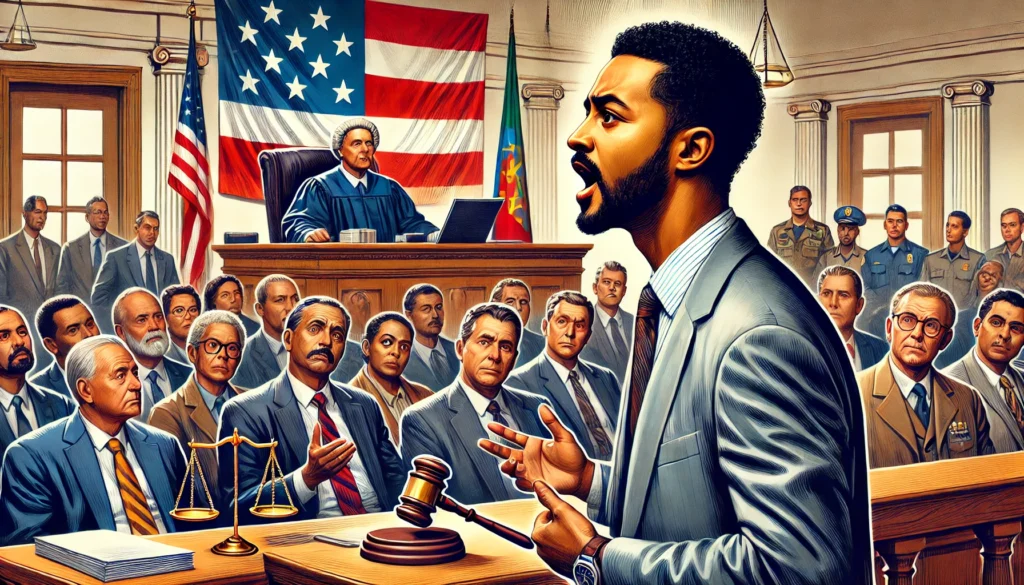Yonas Fikre is a U.S. citizen whose life dramatically changed due to his wrongful placement on the No Fly List. Originally from Eritrea, Yonas moved to the United States seeking the American dream, where he eventually ventured into business and traveled internationally. His story sheds light on significant issues within the U.S. security apparatus and its impact on individual lives.
In this discussion, we delve into Yonas Fikre’s background, exploring his journey from Eritrea to America, and the circumstances that led to his unjust detainment. This account serves not only to introduce Yonas but also to highlight the challenges faced by those who find themselves unfairly targeted by government security measures. Through his story, we’ll uncover the complexities of the No Fly List and its far-reaching consequences.
Yonas Fikre’s Detention: A Timeline
The saga of Yonas Fikre’s detention begins in 2010, when he traveled to Sudan for business. Unbeknownst to Yonas, his trip coincided with a covert FBI investigation that mistakenly implicated him in activities requiring surveillance. This misidentification led to his inclusion on the No Fly List, which subsequently triggered a series of unfortunate events, culminating in his arrest and alleged torture in the UAE, purportedly at the behest of American agents.
Fikre’s harrowing experience in UAE detention centers highlights the severity of his situation. Reports indicate that he underwent extreme interrogation techniques aimed at extracting confessions for crimes he never committed. His release came only after lengthy legal battles and significant media attention, shedding light on the darker aspects of international security operations and their impact on individual human rights.
The No Fly List – What You Need to Know
The No Fly List, managed by the U.S. government’s Terrorist Screening Center, is intended to prevent individuals suspected of terrorist activities from boarding commercial aircraft. While the list is a critical component of national security, it has also been a source of controversy, particularly regarding its impact on civil liberties. Critics argue that it lacks transparency and adequate mechanisms for redress, leading to cases like Yonas Fikre’s, where individuals are unable to challenge their status or even understand why they have been listed.
Understanding the No Fly List involves recognizing both its role in protecting public safety and its potential to infringe on personal freedoms. For individuals like Yonas, the consequences of being placed on this list have been life-altering, emphasizing the need for reform in how such lists are managed and how individuals are added or removed.
Legal Battles and Supreme Court Involvement
Yonas Fikre’s legal journey is a testament to the challenges of fighting against wrongful inclusion on the No Fly List. After his return to the United States, Fikre filed a lawsuit against the FBI, claiming that his rights were violated due to his unlawful detention and the conditions he endured. This case eventually reached the U.S. Supreme Court, which in a landmark decision, allowed him to proceed with his claims. This ruling not only represented a personal victory for Fikre but also set a precedent for how similar cases are handled in the future.
The Supreme Court’s involvement underscored the legal complexities surrounding the No Fly List and its intersection with individual rights. It highlighted the need for judicial oversight in cases where government security measures clash with civil liberties, ensuring that individuals have a means to seek redress.
Human Rights and U.S. Foreign Policy
The case of Yonas Fikre raises important questions about U.S. foreign policy and its alignment with international human rights standards. Fikre’s allegations of torture and mistreatment while detained in the UAE, with the supposed complicity of American officials, bring to light the delicate balance between national security interests and the commitment to human rights. This incident has prompted discussions among policymakers, human rights organizations, and the public about how the United States projects its values on the global stage, especially in partnerships with countries having questionable human rights records.
Analyzing these dynamics is crucial for understanding the broader implications of cases like Yonas Fikre’s. It challenges us to consider how America’s security policies can be structured to uphold not only the safety of its citizens but also the human rights values it espouses.
Aftermath and Current Life of Yonas Fikre
After the tumult of his legal battles and public scrutiny, Yonas Fikre now resides in Sweden, where he has sought to rebuild his life away from the shadows of his past ordeals. His story continues to resonate with many who advocate for reform in how the No Fly List is administered and how individuals are treated by government authorities. Fikre’s case remains a poignant reminder of the personal costs associated with flawed security policies and the ongoing struggle for justice and transparency.
In reflecting on his current situation, it is evident that while some aspects of his life have normalized, the scars left by his experiences continue to influence his outlook and interactions. His story is not just a tale of survival but also a call to action for those committed to reforming the systems that allowed his situation to occur.
How to Protect Yourself Against Unlawful Detention
Understanding the risks and knowing how to protect oneself against unlawful detention are crucial, especially for those who travel frequently or live in politically volatile regions. Here are some tips and resources that can help:
- Stay Informed: Know the laws and your rights in the countries you visit.
- Legal Representation: Always have contact with legal representation familiar with international laws.
- Consular Services: Register your travel plans with your embassy and understand what consular services can offer in an emergency.
- Travel Alerts: Subscribe to travel alerts from reliable sources to stay updated on potential risks in your destination.
These measures, while not foolproof, can provide significant protection and support in the event of unlawful detention or when facing similar challenges as Yonas Fikre.
conclusion
the story of Yonas Fikre serves as a poignant reminder of the challenges and complexities that can arise when national security measures intersect with individual rights. His legal battles, spurred by his wrongful placement on the No Fly List and subsequent detention and alleged torture, highlight critical issues within the U.S. security framework that demand transparency and reform. Fikre’s ordeal underscores the importance of upholding human rights and ensuring justice, prompting ongoing debates and necessary discussions about how such security policies are implemented and regulated. His case not only illustrates the personal costs of such errors but also the broader implications for civil liberties in the global context.
Read More denika kisty







